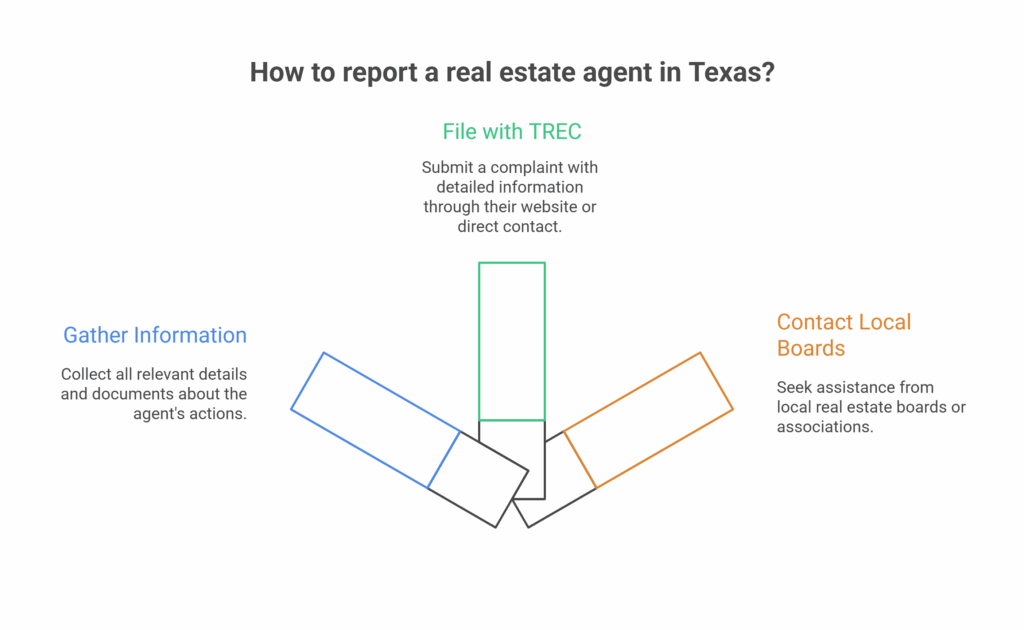Quick Answer: How to Report a Real Estate Agent in Texas?
If you’re wondering how to report a real estate agent in Texas, the process is fairly straightforward. Consumers can file a complaint with the Texas Real Estate Commission (TREC), the governing body that regulates licensed agents and brokers in the state. To begin, gather any documents, emails, contracts, or proof of the issue, and submit them through TREC’s online complaint portal or by mail. Remember, TREC investigates violations of real estate laws and professional standards, not personal disputes.
Understanding How to Report a Real Estate Agent in Texas? ensures your concerns are heard and addressed by the right authority.
Now let’s dive deeper.

1. Understanding When You Should Report an Agent
You can’t report an agent simply because you didn’t like the price you got for your home or the speed of the sale. A complaint to TREC must be based on violations of Texas real estate laws or the agency’s code of ethics. Some legitimate reasons include:
- Fraud or Misrepresentation – Providing false information or failing to disclose important facts about a property.
- Breach of Fiduciary Duty – Putting personal gain over the client’s best interest.
- Unlicensed Activity – Acting as a real estate agent without a valid Texas license.
- Failure to Deliver Funds or Documents – Withholding earnest money, signed contracts, or other important items.
- Improper Advertising – Misleading property listings or making exaggerated claims.
If your situation matches one of these categories, you may have a valid case for filing a complaint.
2. Collect Evidence Before Filing a Complaint
Strong evidence makes your case more credible. Before reporting, collect:
- Emails, Texts, and Written Communications – Keep all correspondence between you and the agent.
- Contracts and Agreements – Signed documents that show the terms you agreed upon.
- Receipts and Payment Proofs – Any financial transactions related to the case.
- Witness Statements – If other people witnessed the agent’s misconduct, their testimony can help.
Keep all records organized and date-stamped. Without proper evidence, TREC may not be able to act on your complaint.
3. Filing a Complaint with TREC
In Texas, the Texas Real Estate Commission is the governing body for real estate agents. Here’s how you can file a complaint:
- Go to the TREC Website – Visit www.trec.texas.gov.
- Use the Online Complaint Form – Fill in all the required details about the incident and the agent.
- Attach Evidence – Upload supporting documents, screenshots, or any proof you’ve collected.
- Submit and Keep a Copy – Always save a copy of your submission for your records.
You can also print a complaint form and mail it to TREC if you prefer a paper process.
4. What Happens After You File?
Once your complaint is submitted, TREC will:
- Acknowledge Your Complaint – They’ll confirm receipt and provide a case number.
- Investigate the Allegations – TREC’s investigators will review your evidence and contact relevant parties.
- Decide on Disciplinary Action – If the agent is found guilty, they may face fines, license suspension, or even license revocation.
It’s important to understand that TREC does not have the authority to order the agent to pay you money for damages. If you are seeking financial compensation, you may need to take legal action separately.
5. Additional Steps You Can Take
While TREC handles the licensing side, you can also:
- Contact the Local Realtor Association – If the agent is a member, they may face additional ethical reviews.
- Leave Reviews – Sharing your experience online can warn others.
- Hire a Real Estate Attorney – If you’ve suffered financial loss, legal counsel can help you recover damages.
6. Tips to Avoid Future Issues with Agents
Reporting a bad experience can be stressful. To avoid similar problems in the future:
- Verify Licenses – Use TREC’s license search tool before working with any agent.
- Ask for References – Speak with past clients.
- Get Everything in Writing – Don’t rely on verbal promises.
- Understand the Contract – Read and question anything that’s unclear.
7. When Reporting an Agent Is Connected to Selling Your Home
Sometimes, people encounter problems with their agent when trying to sell quickly. For instance, if you’re aiming to sell my house fast Texas but your agent makes false promises about how soon it will sell or fails to market it properly, this could be grounds for a complaint—especially if they misled you about the process.
If your agent’s actions prevent you from achieving your goal to sell my house fast Texas, it’s even more important to document their failures clearly. This way, you can provide TREC with a strong, fact-based case.
Remember, you can still successfully sell my house fast Texas by working with a licensed, ethical agent or by considering alternative selling options, such as cash home buyers, who operate under different rules than traditional agents.
Final Thoughts
Reporting a real estate agent in Texas isn’t just about resolving your personal frustration—it’s about protecting the integrity of the industry and preventing other clients from going through similar issues. The process may take time, but if your complaint is legitimate and backed by evidence, TREC can take meaningful action.
Call us anytime at 713-561-5162 or connect with us on our website and we’ll lay out all of your options for your specific situation.
